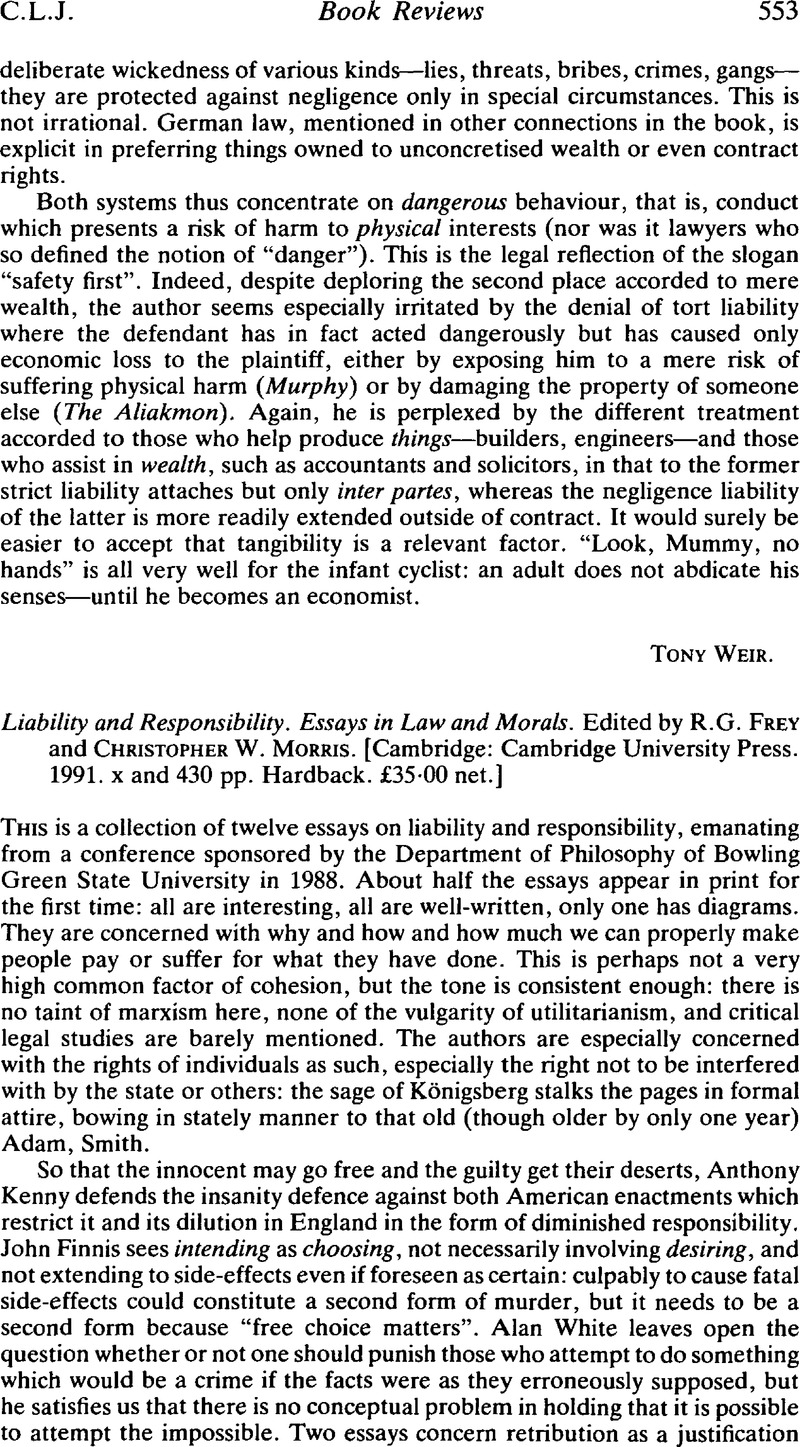Liability and Responsibility: Essays in Law and Morals
Free download. Book file PDF easily for everyone and every device. You can download and read online Liability and Responsibility: Essays in Law and Morals file PDF Book only if you are registered here. And also you can download or read online all Book PDF file that related with Liability and Responsibility: Essays in Law and Morals book. Happy reading Liability and Responsibility: Essays in Law and Morals Bookeveryone. Download file Free Book PDF Liability and Responsibility: Essays in Law and Morals at Complete PDF Library. This Book have some digital formats such us :paperbook, ebook, kindle, epub, fb2 and another formats. Here is The CompletePDF Book Library. It's free to register here to get Book file PDF Liability and Responsibility: Essays in Law and Morals Pocket Guide.
Contents:
Or two lawyers may disagree whether the Supreme Court, in the segregation case, was following established principles or making new law; and the issue between them may turn on what principles are and what it means to apply them.
The first provides a conceptual overview of the issues at stake in a philosophical discussion of liability and responsibility. The second, third, and fourth sections. Cambridge Core - Political Philosophy - Liability and Responsibility - edited by R. G. Frey. Essays in Law and Morals. Liability and Responsibility. Access.
It is unclear how conceptual issues like these are to be resolved; certainly they lie beyond the ordinary techniques of the practicing lawyers. The method chosen, moreover, influences the choice of the particular issues selected for study, though this choice is also affected by intellectual fashion and public affairs.
Recent philosophical work reveals considerable disagreement on the question. The primary functions of law are to establish standards, maintain order, resolve disputes, and protect the liberties and rights of all individual and business. Search for:. Chan, D. Book Description Cambridge University Press, This point is, however, more general than the doctrine of mens rea itself — it being possible for someone to have acted intentionally while, by reason of mental defect, not possessing deliberate control over his actions. Important contemporary statements of the same position have been made in C.
Just now, for example, the question of whether men have a moral obligation to obey the law figures prominently in jurisprudence courses throughout the country; but a decade ago almost no one mentioned that issue. In the s, the dominant approach to jurisprudence in England and America was what one might call a professional approach.
The lawyers who taught jurisprudence recognized that jurisprudential questions, like….
- The Craftsman Builder!
- Judgments of Personal Responsibility.
- Statistics: 1,001 Practice Problems For Dummies (+ Free Online Practice)!
- Accounting assignment help.
- The Labyrinth Makers (Dr. David Audley & Colonel Jack Butler, Book 1)!
- Duty - Wikipedia;
- Steven Soderbergh: Interviews (Revised and Updated Edition) (Conversations with Filmmakers)!
This is exclusive content for subscribers only. If you are already a subscriber, please be sure you are logged in to your nybooks. Facebook Twitter RSS.

Filial piety is considered so important that in some cases, it outweighs other cardinal virtues: In a more modern example, "concerns with filial piety of the same general sort that motivate women to engage in factory work in Korea, Japan, Taiwan, Malaysia, Singapore, Indonesia, and elsewhere in Asia are commonly cited by Thai prostitutes as one of their primary rationales for working in the skin trade ". The gentleman devotes his efforts to the roots, for once the roots are established, the Way will grow there from.
Being good as a son and obedient as a young man is, perhaps, the root of a man's character'".
Duty varies between different cultures and continents. Duty in Asia and Latin America is commonly more heavily weighted than in Western culture. According to a study done on attitudes toward family obligation :. The deeply rooted tradition of duty among both Asian and Latin American cultures contributes to much of the strong sense of duty that exists in comparison to western cultures.
Relating to Responsibility
An arranged marriage is an example of an expected duty in Asia and the Middle East. Patrilocal residence is usual; rarely does the man move in with the woman, or is the married couple allowed to start their own household and life somewhere else. They need to provide for the entire family in labor and care for the farms and family.
Older generations rely heavily on the help from their children's and grandchildren's families. This form of duty is in response to keeping the lineage of a family intact and obliging to the needs of elders.
Theories of Criminal Law (Stanford Encyclopedia of Philosophy)
Friedrich Nietzsche is among the fiercest critics of the concept of duty. Nietzsche claims that the task of all higher education is "to turn men into machines".
- Responsibility essays : #1 Best Essay Writer;
- Who Is Afraid of Death?!
- Responsibility | Internet Encyclopedia of Philosophy;
- Cambridge and Vienna: Frank P Ramsey and the Vienna Circle!
- Causation and Responsibility: An Essay in Law, Morals, and Metaphysics.
The way to turn men into machines is to teach them to tolerate boredom. This is accomplished, Nietzsche says, by means of the concept of duty.
ISBN 13: 9780521392167
From Wikipedia, the free encyclopedia. This article is about the ethical concept. For other uses, see Duty disambiguation. Main article: Civic engagement. See also: Filial piety.